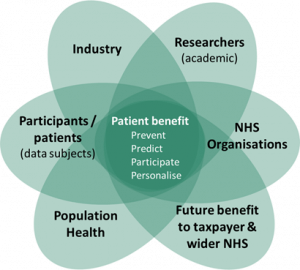 Health data is a uniquely valuable resource for improving treatment and diagnostic options across a range of different illnesses. It’s use, however, also presents many challenges. Alongside the ethical and technological issues that accompany safe collection and storage of data, we must also consider how the data is being used, why it is being used and who will ultimately benefit.
Health data is a uniquely valuable resource for improving treatment and diagnostic options across a range of different illnesses. It’s use, however, also presents many challenges. Alongside the ethical and technological issues that accompany safe collection and storage of data, we must also consider how the data is being used, why it is being used and who will ultimately benefit.
In this article, Mark Avery, Operational Director for Gut Reaction, considers how the Gut Reaction team are working to ensure an acceptable and financially sustainable long-term model for health data research, with patient benefit at its core.
People living with Inflammatory bowel disease (IBD) respond differently to treatments. Finding optimal management approaches for individual patients with Crohn’s disease and ulcerative colitis is challenging, and the resulting delays in disease control impact upon patient quality of life and outcomes. Using de-identified patient data, alongside new techniques in genetics can transform our understanding of the causes of IBD, its progression, and inform development of new, more effective treatments.
Gut Reaction, the Health Data Research Hub for IBD, was formed in 2019 following a three-year funding award from Health Data Research UK (HDR UK) and the UK Research and Innovation (UKRI) Industrial Strategy Challenge Fund (ISCF). Led by Cambridge University Hospitals NHS Foundation Trust, the core aim of the Hub is to develop a secure and sustainable model to securely link hospital medical record, lifestyle and genetic data for people living with IBD who have given their permission for their data to be used for healthcare research. This has only been possible because of the generosity of people with IBD enrolled in the NIHR BioResource who have given their consent for information about their disease to be used in research for the benefit others and wider society.
Substantial progress has been made since the Hub’s inception. Several industry and academic research collaborations are underway and more are in development, with patients playing a key role in the review and approval of data access applications. As we near the end of our initial funding period, we are now focused on ensuring that Gut Reaction is sustainable, so that it can continue to support scientific progress and accountable use of patient data long into the future.
Gut Reaction is a partnership between the NHS, academia, industry and the third sector, working together to safely and transparently provide access to curated data for research and innovation in IBD, building on the consented health, lifestyle and genetic data held by the NIHR IBD BioResource (n=35,000).
By linking the consented participant data from the NIHR IBD BioResource with longitudinal structured clinical data from the UK IBD Registry (including clinician assessments and patient-reported outcomes), longitudinal data from NHS Trusts, health episode statistics from NHS Digital, and whole exome and whole genome sequencing from the Wellcome Sanger Institute, Gut Reaction offers a unique, data-rich resource enabling research that would not previously have been possible.
Facing future challenges: where next for Gut Reaction?
As Gut Reaction looks to the future , key decisions are being made to ensure that this resource continues to benefit the IBD community. A sustainable model to support academic and industry research and development requires the needs of all key stakeholders to be balanced; there needs to be a compelling value proposition for each stakeholder group, with patient and public benefit the central convening theme.
Patients’ views are key; our Patient Advisory Committee’s input has helped shape how Gut Reaction data is stored, curated, accessed and used. Patients sitting on the Data Access Committee are involved in reviewing and approving data access applications to ensure that all approved research is undertaken with their support, and has the potential to benefit the IBD community.

Figure 1: The Gut Reaction model considers all interested parties for a sustainable and productive future, actively working to balance the needs of our patient community alongside academic and commercial research bodies who wish to access our data, while ensuring wider benefit to patients, the NHS, and society
The Gut Reaction partnership represents an ongoing commitment to evolve to meet the needs of our stakeholders. Feedback from patients is already leading to changes in our review and approval procedures, including increased patient representation in data access application review processes and the formation of a new Data Access Committee. Our new Cohort Discovery Tool, allowing more in-depth study feasibility checks for researchers without compromising data safety and privacy, also reflects our collaborative way of working. Signs that this approach is successful are clear, with 11 Gut Reaction datasets currently available through the HDR UK Innovation Gateway increasing academic and commercial data access applications, additional NHS Trusts joining the partnership and growing numbers of patients involved through the NIHR IBD BioResource.
Drawing on the experience of the expert partners comprising Gut Reaction, and building on our successes so far, we are actively working towards a sustainable model for innovation in IBD balancing the need for data safety and rapid research to drive innovation. Feedback from our patients, researchers and funders confirms the acceptability of our approach to date, and we look forward to seeing our progress to date translated into meaningful long-term benefits for the IBD community.

